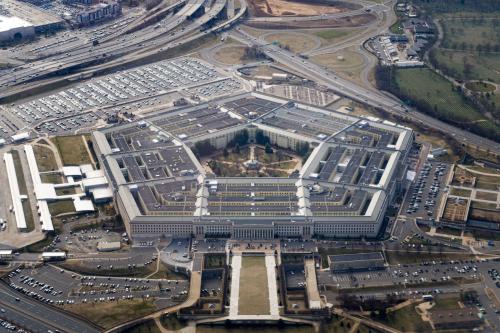If any comfort can be found in the darkness following the terrorist attacks on New York and Washington, perhaps it lies in the federal government’s extraordinary record of achievement over the past half century. Despite what seemed to be insurmountable odds, the federal government:
- Helped rebuild Europe after World War II.
- Conquered polio and a host of other life-threatening diseases.
- Faced down communism.
- Attacked racial discrimination in the voting booth, the housing market and the public square.
- Cut poverty among the nation’s elderly to its lowest levels in modern history.
Assassinations, riots, terrorist bombings and unpopular wars did not halt progress on these extraordinary achievements. Neither will the horrific attacks of Sept. 11. To the extent that a nation’s greatness is measured by what its government has accomplished—through good times and bad—Americans can have confidence in the federal government’s efforts to restore a sense of security.
The proof is in the federal statute books, which contain more than 500 laws—as far back as 1946—dealing with a host of domestic and foreign problems. Having emerged victorious from World War II and the Great Depression, Congress called upon the federal government to tackle an agenda worthy of the world’s greatest democracy:
- Advancing human rights abroad.
- Expanding home ownership for an entire generation.
- Enhancing the right to vote.
- Improving air and water quality.
- Reducing the threat of nuclear war.
- Promoting open housing for all races.
- Protecting endangered species.
- Reducing hunger.
- Building the world’s strongest defense.
Some failures have been mixed in with the success, but Congress has never shied away from asking the federal government to tackle tough problems. In fact, government’s track record should make Americans proud.
Try as one might to give credit to a single party, President or institution, the vast majority of the federal government’s greatest achievements of the past half century are the product of bipartisanship and cooperation among Congress, the President and the judiciary. Achievement is almost always to be found in the search for common ground across the political divide.
Achievement also is found in persistence. In the fight against terrorism, remember that the federal government makes its greatest progress by building on its past successes. That is how the air and water have become cleaner, veterans of war have returned to civilian life, and diseases such as polio and tuberculosis were defeated. Americans are likely to clamor for a single law that can make the nation safe again, but the past teaches us that government achievement rarely involves a single statute. Just look at Medicare and the Voting Rights Act. Poverty among the elderly has fallen, but that required 12 increases in Social Security benefits since 1946 and two major rescue efforts during times of financial crisis. The right to vote has been expanded and protected, but it took a half dozen laws and at least two constitutional amendments to do so.
Achievement is firmly rooted in both the moral rightness of the cause and unrelenting faith in America’s ability to accomplish the impossible. No one knew for sure whether the United States could expand the right to vote and erase the color barrier in public accommodations. But it has succeeded in both efforts. Nor did anyone know for sure whether the United States could rebuild Europe after the devastation of World War II or land a man on the moon. But it did.
These lessons are echoed in the list of the federal government’s greatest failures. Federal efforts to expand low-income housing, renew impoverished communities and improve urban mass transit have all foundered. The reason is that these efforts were overidentified with one political party or President, poorly explained and underfunded.
In this era of promises to create smaller, more limited government, it is important to remember that the federal government has amassed a distinguished record of endeavor that no other sector—private or nonprofit—could create on its own. Perhaps that is why President Bush took such great pains after the terrorist attacks to reassure the American public that he would bring the full power of the federal government to bear against the terrorists and why he promised that the federal government would be back in business the day after the attacks.
Americans might have doubts about when and where to trust government to do the right thing, but we know that our nation cannot endure without a federal government that is willing to take great risks. Americans are asking great things of government in responding to this crisis. If the past is prologue, the effort bipartisan and perseverance sustained, the federal government is well on its way to success.
Paul C. Light is Vice President and Director of Governmental Studies at the Brookings Institution and Senior Adviser to The Presidential Appointee Initiative.
The Brookings Institution is committed to quality, independence, and impact.
We are supported by a diverse array of funders. In line with our values and policies, each Brookings publication represents the sole views of its author(s).



Commentary
Op-edA Ray of Hope in a Dark Moment
October 1, 2001